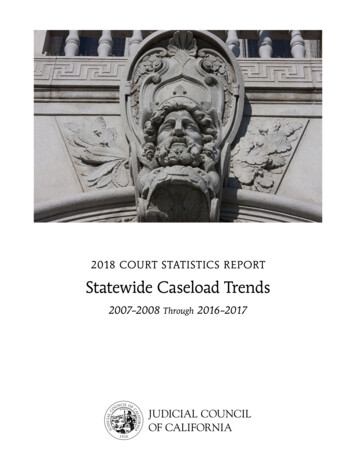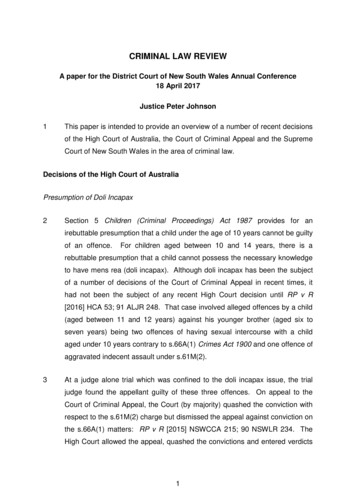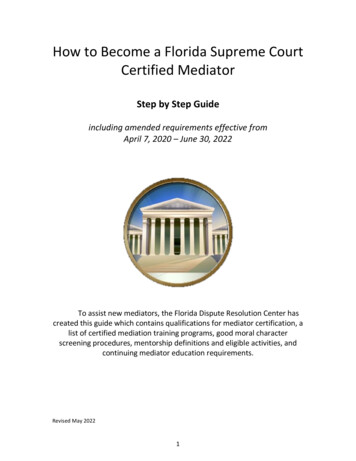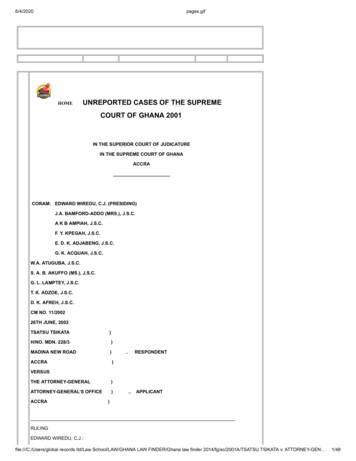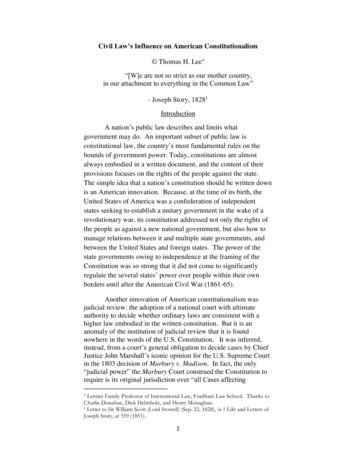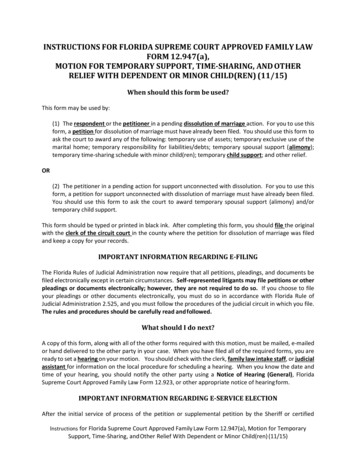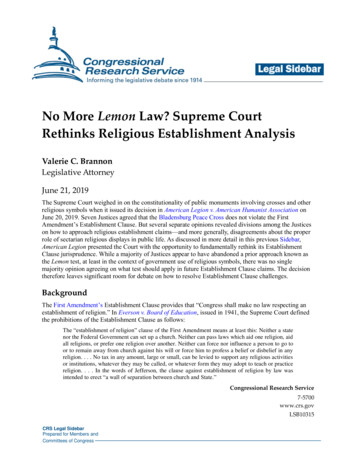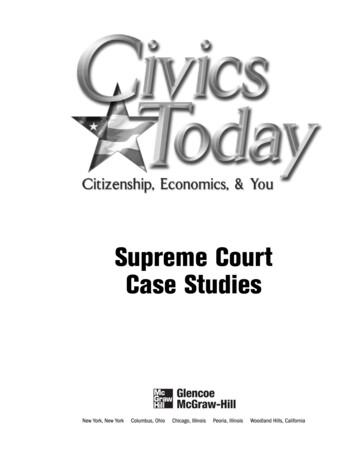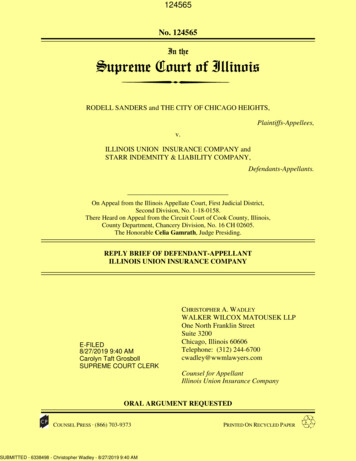
Transcription
124565No. 124565In theSupreme Court of IllinoisRODELL SANDERS and THE CITY OF CHICAGO HEIGHTS,Plaintiffs-Appellees,v.ILLINOIS UNION INSURANCE COMPANY andSTARR INDEMNITY & LIABILITY COMPANY,Defendants-Appellants.On Appeal from the Illinois Appellate Court, First Judicial District,Second Division, No. 1-18-0158.There Heard on Appeal from the Circuit Court of Cook County, Illinois,County Department, Chancery Division, No. 16 CH 02605.The Honorable Celia Gamrath, Judge Presiding.REPLY BRIEF OF DEFENDANT-APPELLANTILLINOIS UNION INSURANCE COMPANYE-FILED8/27/2019 9:40 AMCarolyn Taft GrosbollSUPREME COURT CLERKCHRISTOPHER A. WADLEYWALKER WILCOX MATOUSEK LLPOne North Franklin StreetSuite 3200Chicago, Illinois 60606Telephone: (312) 244-6700cwadley@wwmlawyers.comCounsel for AppellantIllinois Union Insurance CompanyORAL ARGUMENT REQUESTEDCOUNSEL PRESS (866) 703-9373SUBMITTED - 6338498 - Christopher Wadley - 8/27/2019 9:40 AMPRINTED ON RECYCLED PAPER
124565POINTS AND AUTHORITIESI.This Court Should Reverse the Appellate Court’s Decision and Affirm theCircuit Court’s Judgment Because No “Offense” of “Malicious Prosecution”Took Place “During” Any Illinois Union Policy Period. . 1First Mercury Insurance Co. v. Ciolino, 2018 IL App (1st) 171532 .1Indian Harbor Insurance Co. v. City of Waukegan, 2015 IL App (2d) 140293 .1St. Paul Fire & Marine Insurance Co. v. City of Waukegan, 2017 IL App (2d)160381.2Sanders v. Illinois Union Insurance Co., 2019 IL App (1st) 180158 .1A.Illinois Union’s Proposed Trigger (the Initiation of the MaliciousProsecution) Is Clear, Consistent, and Does Not (as SandersContends) Permit an Insurer to “Pick and Choose” DifferentElements of the Tort to Trigger Coverage. .3First Mercury Insurance Co. v. Ciolino, 2018 IL App (1st) 171532 .3, 6Spiegel v. Zurich Insurance Co., 293 Ill. App. 3d 129 (1997) .3Beaman v. Freesmeyer, 2019 IL 122654 .4St. Paul Fire & Marine Insurance Co. v. City of Zion, 2014 IL App (2d) 131312 .5Town of Newfane v. General Star National Insurance Co., 784 N.Y.S.2d 787(App. Div. 2004) .5M. Jane Goode, 1 Law & Practice of Insurance Coverage Litigation § 6:26 (June2019 update).7B.The Plain, Ordinary, and Popular Meaning of the Term“Malicious Prosecution” Supports the Conclusion that the“Offense” of “Malicious Prosecution” Occurs Upon the Initiationof the Malicious Action. .7Travelers Insurance Co. v. Eljer Manufacturing, Inc., 197 Ill. 2d 278 (2001) .8American States Insurance Co. v. Koloms, 177 Ill. 2d 473 (1997).8Outboard Marine Corp. v. Liberty Mutual Insurance Co., 154 Ill. 2d 90 (1992) .8Spiegel v. Zurich Insurance Co., 293 Ill. App. 3d 129 (1997) .8, 9, 10SUBMITTED - 6338498 - Christopher Wadley - 8/27/2019 9:40 AMi
124565Indian Harbor Insurance Co. v. City of Waukegan, 2015 IL App (2d) 140293 .9Muller Fuel Oil Co. v. Insurance Co. of North America, 95 N.J. Super. 564, 577(App. Div. 1967) .9Town of Newfane v. General Star National Insurance Co., 784 N.Y.S.2d 787(App. Div. 2004) .8, 10Mitchinson v. Cross, 58 Ill. 366 (1871) .9Dutton v. Roo-Mac, Inc., 100 Ill. App. 3d 116 (1981).10Malicious Prosecution, Merriam-Webster Online Dictionary, prosecution (visitedAugust 5, 2019) .8Malicious Prosecution, Black’s Law Dictionary (11th ed. 2019) .9C.The Fact That a Malicious Prosecution Claim Can Be Based onthe Insured Tortfeasor’s “Continuation” of Criminal ProceedingsAfter Probable Cause Ceases to Exist Does Not Support anExoneration Trigger or Multiple Triggers. .10Selective Insurance Co. of the Southeast v. RLI Insurance Co., 706 Fed. App’x260 (6th Cir. 2017).11, 12D.The Case Law Cited by Sanders and the City to Support anExoneration Trigger or Multiple Triggers Is Inapposite andUnpersuasive. .12St. Paul Fire & Marine Insurance Co. v. City of Zion, 2014 IL App (2d) 131312 .13, 14Indian Harbor Insurance Co. v. City of Waukegan, 2015 IL App (2d) 140293 .13, 14, 17St. Paul Fire & Marine Insurance Co. v. City of Waukegan, 2017 IL App (2d)160381.13, 14, 16, 17, 18First Mercury Insurance Co. v. Ciolino, 2018 IL App (1st) 171532 .14, 16, 18Security Mutual Casualty Co. v. Harbor Insurance Co., 65 Ill. App. 3d 198(1978), rev’d on other grounds, 77 Ill. 2d 446 (1979).12, 13, 14National Casualty Co. v. McFatridge, 604 F.3d 335 (7th Cir. 2010) .13American Safety Casualty Insurance Co. v. City of Waukegan, 678 F.3d 475 (7thCir. 2012) .13, 14SUBMITTED - 6338498 - Christopher Wadley - 8/27/2019 9:40 AMii
124565Northfield Insurance Co. v. City of Waukegan, 701 F.3d 1124 (7th Cir. 2012) .13Westport Insurance Corp. v. City of Waukegan, No. 14-cv-419, 2017 WL4046343 (N.D. Ill. Sept. 3, 2017) .14North River Insurance Co. v. Broward County Sheriff’s Office, 428 F. Supp. 2d1284 (S.D. Fla. 2006) .15Zurich Insurance Co. v. Peterson, 232 Cal. Rptr. 807 (Ct. App. 1986) .14S. Freedman & Sons, Inc. v. Hartford Fire Insurance Co., 396 A.2d 195 (D.C.1978) .14Roess v. St. Paul Fire & Marine Insurance Co., 383 F. Supp. 1231 (M.D. Fla.1974) .14Sauviac v. Dobbins, 949 So. 2d 513 (La. Ct. App. 2006) .14American Guarantee & Liability Insurance Co. v. 1906 Company, 273 F.3d 605(5th Cir. 2001) .15, 16City of Erie, Pa. v. Guaranty National Insurance Co., 109 F.3d 156 (3d Cir. 1997) .16Nicor, Inc. v. Associated Electric & Gas Insurance Services Ltd., 223 Ill. 2d 407(2006) .16, 17Travelers Indemnity Co. v. Mitchell, 925 F.3d 236 (5th Cir. 2019) .16, 17, 18Neglen v. Breazeale, 945 So. 2d 988, 990 (Miss. 2006) .15Snyder v. Heidelberger, 2011 IL 111052.15SUBMITTED - 6338498 - Christopher Wadley - 8/27/2019 9:40 AMiii
124565ARGUMENTI.This Court Should Reverse the Appellate Court’s Decision and Affirm theCircuit Court’s Judgment Because No “Offense” of “Malicious Prosecution”Took Place “During” Any Illinois Union Policy Period.Sanders and the City argue that the “offense” of “malicious prosecution” in this casedid not occur in 1994, when City police officers framed Sanders and caused false criminalcharges to be filed against him, but in 2014, when Sanders was acquitted. For the most part,Sanders and the City rely on the same flawed reasoning employed by the appellate courtmajority below to support their argument.As Illinois Union explained in greater detail in its opening brief, the conclusion thatthe “offense” of “malicious prosecution” does not occur until exoneration is incorrect fornumerous reasons, including the following: First, it “distort[s] the common, popularmeaning of what is meant by an ‘offense.’” First Mercury Insurance Co. v. Ciolino, 2018IL App (1st) 171532, ¶ 32. Second, it improperly “limit[s] the meaning of ‘offense’ byrequiring the completion of tort law elements.” Id. ¶ 31. Third, it is inconsistent with theintended operation of an occurrence-based policy, which, “containing multiple referencesto coverage for *** offenses happening during the policy period, reflects the intent to insureonly for the insured’s acts or omissions that happen during a policy period.” Indian HarborInsurance Co. v. City of Waukegan, 2015 IL App (2d) 140293, ¶ 32 (Indian Harbor).Fourth, it would result in unwise policy implications, such as “invit[ing] insurers toselectively decline to write or renew insurance once the insured’s potential liability formalicious prosecution [is] raised but before the right to sue *** accrue[s].” Sanders v.Illinois Union Insurance Co., 2019 IL App (1st) 180158, ¶ 48 (Mason, J., dissenting). (SeeIllinois Union Br. at 11-29.)SUBMITTED - 6338498 - Christopher Wadley - 8/27/2019 9:40 AM1
124565Alternatively, Sanders and the City argue that a separate “offense” of “maliciousprosecution” occurred each time Sanders was tried on the 1994 criminal charges, includingthe retrials that occurred in 2013 and 2014. Those retrials were not separate “offenses” of“malicious prosecution” because Sanders was retried on the same false charges that werefiled against him in 1994. Indeed, the docket number of the criminal case never changedfrom 1994 until the prosecution concluded. (R. V6, C2623-59.) Accordingly, there was asingle prosecution and only one corresponding “offense” of “malicious prosecution,”which occurred upon commencement of the prosecution. St. Paul Fire & Marine InsuranceCo. v. City of Waukegan, 2017 IL App (2d) 160381, ¶ 36 (City of Waukegan). (See IllinoisUnion Br. at 29-31.)Rather than rehashing these arguments in detail, Illinois Union submits this reply tomake the following four points: First, Illinois Union’s proposed trigger (the initiation ofthe criminal prosecution) is clear, consistent, and does not (as Sanders contends) permit aninsurer to “pick and choose” different elements of the tort to trigger coverage. Second, theplain, ordinary, and popular meaning of the term “malicious prosecution” supports theconclusion that the “offense” of “malicious prosecution” occurs upon initiation of themalicious prosecution. Third, the fact that a malicious prosecution action can be based onthe insured tortfeasor’s “continuation” of criminal proceedings after probable cause ceasesto exist does not support an exoneration trigger or multiple triggers. Fourth, the case lawcited by Sanders and the City to support an exoneration trigger or multiple triggers isinapposite and unpersuasive.Each point is discussed in greater detail below.SUBMITTED - 6338498 - Christopher Wadley - 8/27/2019 9:40 AM2
124565A.Illinois Union’s Proposed Trigger (the Initiation of the MaliciousProsecution) Is Clear, Consistent, and Does Not (as Sanders Contends)Permit an Insurer to “Pick and Choose” Different Elements of the Tort toTrigger Coverage.Sanders attempts to create ambiguity in Illinois Union’s interpretation of the policyby contending that Illinois Union’s position is “contradictory” and creates a “free-for-all”that allows an insurer to “pick and choose” the trigger date that suits its interest. (SandersBr. at 2, 10.) None of that is true. Illinois Union’s proposed trigger is clear, consistent, andappropriately allows for only a single trigger of coverage for the “offense” of “maliciousprosecution.”First, Sanders mischaracterizes Illinois Union’s position when he accuses IllinoisUnion of advocating three different triggers: (1) the police officer’s underlyinginvestigative misconduct, e.g., fabrication of evidence; (2) the commencement of a falsecriminal proceeding based on that misconduct; and (3) the resulting injury suffered by theclaimant. To the contrary, Illinois Union proposes a single trigger: the date upon which theinsured causes a criminal prosecution to be commenced against the claimant with maliceand without probable cause.That trigger follows from the policy’s plain terms. “Offense” refers to “a wrongfulact or conduct committed during the policy period.” First Mercury, 2018 IL App (1st)171532, ¶ 30. “‘Malicious prosecution’ is the bringing of a suit known to be groundless.”(Emphasis added.) Spiegel v. Zurich Insurance Co., 293 Ill. App. 3d 129, 134 (1997). Itfollows that the “offense” of “malicious prosecution” consists of the insured’s wrongfulact in commencing an improper court proceeding. That is the event that triggers coveragefor the “offense” of “malicious prosecution” under an occurrence-based liability insurancepolicy.SUBMITTED - 6338498 - Christopher Wadley - 8/27/2019 9:40 AM3
124565Sanders attempts to confuse the issue by pointing out that, in a criminal proceeding,the prosecution is typically handled by a state prosecutor, rather than a police officer. Thus,according to Sanders, the wrongful act committed by the police officer is not thecommencement of the prosecution but rather the underlying investigatory misconduct,such as the fabrication of evidence upon which the criminal charges are based. Sandersthen argues that there may be a time gap between the police officer’s investigatorymisconduct and the commencement of the criminal prosecution, which, according toSanders, renders it inappropriate to interpret the term “offense” to mean the wrongful act.(Sanders Br. at 2.)Sanders’s argument reflects a misunderstanding of the “offense” that gives rise to amalicious prosecution claim. A police officer’s investigatory misconduct does not,standing alone, constitute an “offense” of “malicious prosecution.” Rather, the “offense”of “malicious prosecution” occurs only if the police officer “causes” a wrongful criminalprosecution to occur. Beaman v. Freesmeyer, 2019 IL 122654, ¶ 41. Thus, it is thecommencement of the malicious criminal prosecution that constitutes the “offense” of“malicious prosecution” and therefore triggers coverage, not the underlying investigativemisconduct upon which the prosecution is based. The commencement of the maliciouscriminal prosecution provides a clear, unambiguous, and readily apparent trigger date forcoverage that is consistent with the policies’ plain terms.Relatedly, Sanders contends that the commencement of the criminal action cannotconstitute the “offense” of “malicious prosecution,” at least with respect to city policeofficers, because a state prosecutor makes the ultimate charging decision and “anydefinition of ‘offense’ that is tied to a non-tortfeasor’s conduct is untenable.” (Sanders Br.SUBMITTED - 6338498 - Christopher Wadley - 8/27/2019 9:40 AM4
124565at 21.) Sanders’s argument misses the mark. As stated above, to be held liable for maliciousprosecution, the city police officer must have “caused” the prosecution, which means thatthe city police officer is, in fact, responsible for the commencement of the criminalprosecution, even if the charges are formally filed by a prosecuting attorney. Moreover,Sanders’s position that the “offense” must be “tied to” the police officer’s conductobviously undermines his argument that the “offense” occurs upon exoneration, over whichthe police officer asserts no control. Town of Newfane v. General Star National InsuranceCo., 784 N.Y.S.2d 787, 793 (App. Div. 2004) (“[I]n most criminal matters, the originalcriminal complainant quickly loses control of the prosecution to the pertinent prosecutorialauthorities, meaning that the fact of termination is likewise generally outside the control ofthe insured. Those facts render it inappropriate in our view to equate the termination withthe *** ‘offense’ triggering insurance coverage”).With respect to Sanders’s contention that Illinois Union has advocated an “injury”trigger, Sanders cites various portions of Illinois Union’s brief where Illinois Union pointsout that, in the context of malicious prosecution, the commencement of the malicious actionand the resulting injury occur simultaneously. This is not (or, at least, should not be) acontroversial point, nor does it reflect any inconsistency in Illinois Union’s position.Rather, courts have repeatedly recognized that “a maliciously prosecuted criminaldefendant suffers injury and damage immediately upon being prosecuted.” St. Paul Fire &Marine Insurance Co. v. City of Zion, 2014 IL App (2d) 131312, ¶ 26 (City of Zion) (citingcases).For the same reason, there is no inconsistency between Illinois Union’s and Starr’spositions. Starr’s point, as Illinois Union understands it, is simply that the policies reflectSUBMITTED - 6338498 - Christopher Wadley - 8/27/2019 9:40 AM5
124565an intent to require that both the wrongful act (the “Occurrence”) and the injury(“Personal Injury”) occur during the policy period. The policies then define“Occurrence” and “Personal Injury” as the “offense” of “malicious prosecution” inrecognition of the fact that, when a malicious action is commenced, the wrongful act andinjury occur simultaneously. Based on that fact, there is no need for the policy to usedifferent terms to define “Occurrence” and “Personal Injury” to effectuate the policy’sintent. Rather, the “offense” of “malicious prosecution” (the filing of false charges)encompasses both the wrongful act and the injury.Illinois Union does not disagree with Starr. At the same time, the Court does not haveto go that far to determine that Sanders’s malicious prosecution claim against the City isnot covered. Rather, it is sufficient for the Court to conclude, consistent with the appellatecourt’s decision in First Mercury, that the word “offense” refers to the insured’s wrongfulact in commencing a criminal action maliciously and without probable cause. 2018 IL App(1st) 171532, ¶¶ 30-35. The more important point is that, given this policy structure, itwould be unreasonable to interpret “Occurrence” and “Personal Injury” (both defined asthe “offense” of “malicious prosecution”) to refer to neither the wrongful act nor theresulting injury but rather Sanders’s subsequent exoneration.Finally, as the above discussion illustrates, Illinois Union’s interpretation does notresult in a “free-for-all” or permit an insurer to “pick and choose” the trigger of coveragethat suits its interest in any particular case. Rather, when a policy covers an “offense” of“malicious prosecution” happening “during” the policy period, the insurer must respond tothe claim if the underlying wrongful action was commenced while the insurer’s policy wasin effect. If the action was not commenced during the policy period, then no coverageSUBMITTED - 6338498 - Christopher Wadley - 8/27/2019 9:40 AM6
124565exists. This provides a clear, consistent, and unambiguous trigger date for insureds andtheir insurers to determine which carriers must respond to a given claim when the policiesdefine coverage in terms of the “offense” of malicious prosecution.1B.The Plain, Ordinary, and Popular Meaning of the Term “MaliciousProsecution” Supports the Conclusion That the “Offense” of “MaliciousProsecution” Occurs Upon the Initiation of the Malicious Action.Second, Sanders and the City argue that the policies’ use of the term “maliciousprosecution” supports the conclusion that the “offense” of “malicious prosecution” occursupon exoneration, rather than initiation of the malicious action, because “maliciousprosecution” is a “tort” and favorable termination is an element of the tort. (Sanders Br. at14-15; City Br. at 16-17.) Relatedly, Sanders argues that there is “no principled way to pickand choose amongst the elements of this tort such that some of them constitute the ‘gist’or ‘essence’ of the tort,” and that focusing on the “gist or essence” of the tort as theinsured’s wrongful act renders the policies’ terms redundant because the same wrongfulact may satisfy elements of other covered torts, such as false arrest, false imprisonment, orwrongful detention. (Sanders Br. at 14-16.)None of these arguments has merit. To the contrary, the common understanding ofthe term “malicious prosecution” supports the conclusion that the “offense” of “maliciousprosecution” occurs when the malicious action is initiated, not when it is terminated.Notably, contrary to Sanders’s assertion, Illinois Union is not advocating a “blanket rule”that would apply to all liability insurance policies, regardless of the language used. Theparties can negotiate a different trigger of coverage. That said, coverage for the “offense”of “malicious prosecution” is a standard term in many commercial general liabilityinsurance policies. See M. Jane Goode, 1 Law & Practice of Insurance Coverage Litigation§ 6:26 (June 2019 update). Accordingly, it is particularly appropriate for the Court toconsider the wider implications of its interpretation of the instant policies’ terms.1SUBMITTED - 6338498 - Christopher Wadley - 8/27/2019 9:40 AM7
124565As a threshold matter, Illinois Union agrees that “malicious prosecution” is a “tort”and thus coverage applies only to the tort cause of action for malicious prosecution. See,e.g., Spiegel, 293 Ill. App. 3d at 132 (concluding that coverage for “malicious prosecution”does not include sanctions imposed by a court for frivolous litigation). That does not,however, answer the question of when the “offense” of “malicious prosecution” occurs forpurposes of triggering coverage under an occurrence-based liability insurance policy. SeeTown of Newfane, 784 N.Y.S.2d at 792 (concluding that date cause of action ripened doesnot “determine[] the issue at hand” because “the policy speaks not of the date upon whichan action could have been brought *** but of when the ‘offense [was] committed”).Rather, to answer that question, the Court must construe the policies “as a whole”and “‘take into account the type of insurance purchased, the nature of the risks involved,and the overall purpose of the contract.’” Travelers Insurance Co. v. Eljer Manufacturing,Inc., 197 Ill. 2d 278, 292 (2001) (quoting American States Insurance Co. v. Koloms, 177Ill. 2d 473, 479 (1997)). The Court must also afford the policies’ terms their “plain,ordinary, and popular meaning.” (Emphasis omitted.) Id. (quoting Outboard Marine Corp.v. Liberty Mutual Insurance Co., 154 Ill. 2d 90, 108 (1992)).Toward that end, Sanders and the City cite the Merriam-Webster Online Dictionaryand Black’s Law Dictionary, which refer to “malicious prosecution” as a “tort,” butSanders and the City omit the portions of the definitions that undermine their arguments.(Sanders Br. at 15; City Br. at 17.) In particular, the Merriam-Webster Online Dictionarydefines “malicious prosecution” as “the tort of initiating a criminal prosecution or civil suitagainst another party with malice and without probable cause.” (Emphasis added.)Malicious Prosecution, Merriam-Webster Online Dictionary, https://www.merriam-SUBMITTED - 6338498 - Christopher Wadley - 8/27/2019 9:40 AM8
124565webster.com/legal/malicious%20prosecution (visited August 5, 2019). Black’s LawDictionary similarly defines “malicious prosecution” as “[t]he institution of a criminal orcivil proceeding for an improper purpose and without probable cause.” (Emphasis added.)Malicious Prosecution, Black’s Law Dictionary (11th ed. 2019). And both definitions areconsistent with the Illinois Appellate Court’s description of “malicious prosecution” inSpiegel as “the bringing of a suit known to be groundless.” (Emphasis added.) 293 Ill. App.3d at 134.These authorities show that the term “malicious prosecution” is generally understoodto mean a tort occasioned by the institution of a legal proceeding with malice and withoutprobable cause. To be sure, the law prescribes certain elements that must be establishedbefore a tort claimant can pursue a cause of action for an earlier malicious prosecution,including favorable termination, but “the ‘essence’ of the tort of malicious prosecution isthe wrongful conduct in making the criminal charge.” Indian Harbor, 2015 IL App (2d)140293, ¶ 23 (citing Muller Fuel Oil Co. v. Insurance Co. of North America, 95 N.J. Super.564, 577 (App. Div. 1967)). See also Mitchinson v. Cross, 58 Ill. 366 (1871) (“The gist ofthe action for malicious prosecution is, that the prosecutor acted without probable cause.”).Accordingly, the common understanding of “malicious prosecution” supports theconclusion that the “offense” of “malicious prosecution” occurs when the action iscommenced.Moreover, interpreting “malicious prosecution” in this manner does not render thepolicy’s coverage for other torts, such as false arrest or imprisonment, redundant. Maliciousprosecution and false imprisonment are different torts that involve different wrongful acts.As stated above, malicious prosecution involves “the bringing of a suit known to beSUBMITTED - 6338498 - Christopher Wadley - 8/27/2019 9:40 AM9
124565groundless,” Spiegel, 293 Ill. App. 3d at 134, and the “offense” occurs when the action isinitiated. False imprisonment, on the other hand, involves the act of unlawfully restraininga person against his or her will, Dutton v. Roo-Mac, Inc., 100 Ill. App. 3d 116, 119 (1981),and the “offense” occurs when the arrest is made. Of course, malicious prosecution andfalse imprisonment may sometimes arise out of the same underlying police misconduct butthey still involve discrete acts (one involves the initiation of a criminal prosecution, theother an arrest). It nevertheless makes sense that, since the false arrest and maliciousprosecution may occur at the same time and involve the same underlying policemisconduct, the same policies will respond to both claims. See Town of Newfane, 784N.Y.S.2d at 794 (observing that an exoneration trigger for the “offense” of “maliciousprosecution” would “make no sense” because it would mean that different insurers wouldbe called upon to defend the insured against false arrest and malicious prosecution claimsarising out of the same underlying police misconduct committed by the same officials).C.The Fact That a Malicious Prosecution Claim Can Be Based on the InsuredTortfeasor’s “Continuation” of Criminal Proceedings After ProbableCause Ceases to Exist Does Not Support an Exoneration Trigger orMultiple Triggers.Third, Sanders’s and the City’s arguments that an exoneration trigger or multipletriggers should be used because a malicious prosecution claim can be based on an insuredtortfeasor’s “continuation” of criminal proceedings similarly lacks merit. (Sanders Br. at12, 25; City Br. at 44.) To be sure, Illinois Union agrees an insured tortfeasor can be heldliable for malicious prosecution if he or she has probable cause when the action is initiatedbut, during the course of the proceedings, probable cause ceases to exist and the insuredcontinues to prosecute the action. For example, a police officer may have probable causeto believe that someone has committed a crime at the time criminal proceedings areSUBMITTED - 6338498 - Christopher Wadley - 8/27/2019 9:40 AM10
124565commenced but later discover exculpatory evidence that establishes the criminaldefendant’s innocence. In that event, the “offense” of “malicious prosecution” occurs whenthe police officer “causes” the “continuation” of the prosecution by failing to disclose theexculpatory evidence. That, of course, is not the case here because Sanders alleged that theCity framed him with evidence fabricated before he was ever charged and that the Citytherefore lacked probable cause to prosecute him from the outset. (R. V5, C2340-45 [A8186].)Even when law enforcement has probable cause to prosecute at the beginning of acriminal case but later loses that probable cause, there is still only one “trigger” ofcoverage. This is demonstrated by Selective Insurance Co. of the Southeast v. RLIInsurance Co., 706 Fed. App’x 260 (6th Cir. 2017). In that case, police officers employedby the City of Barberton, Ohio, arrested Clarence Elkins on June 8, 1998, and charged himwith rape and murder. Id. at 261. The officers had probable cause to believe that Elkinswas guilty from the date of the original charges until January 5, 1999, when another man,Earl Mann, implicated himself in the crimes. Id. at 262. The officers did not, however,disclose Mann’s admission, which caused the prosecution of Elkins to continue afterprobable cause ceased to exist. Id. Elkins was convicted in June 1999 but exonerated in2005 after it was determined that Mann’s DNA matched DNA found on the victim’s body.Id. at 262-63.Elkins sued the city for malicious prosecution, and a dispute arose over which of twoinsurance carriers owed coverage. RLI Insurance Company (RLI) insured the city forliability for an “offense” of “malicious prosecution” occurring prior to June 29, 1998. Id.The prosecution of Elk
ILLINOIS UNION INSURANCE COMPANY C HRISTOPHER A. WADLEY WALKER WILCOX MATOUSEK LLP One North Franklin Street Suite 3200 Chicago, Illinois 60606 Telephone: (312) 244-6700 cwadley@wwmlawyers.com Counsel for Appellant Illinois Union Insurance Company ORAL ARGUMENT REQUESTED COUNSEL PRESS (866) 703-9373 PRINTED ON RECYCLED PAPER E-FILED


